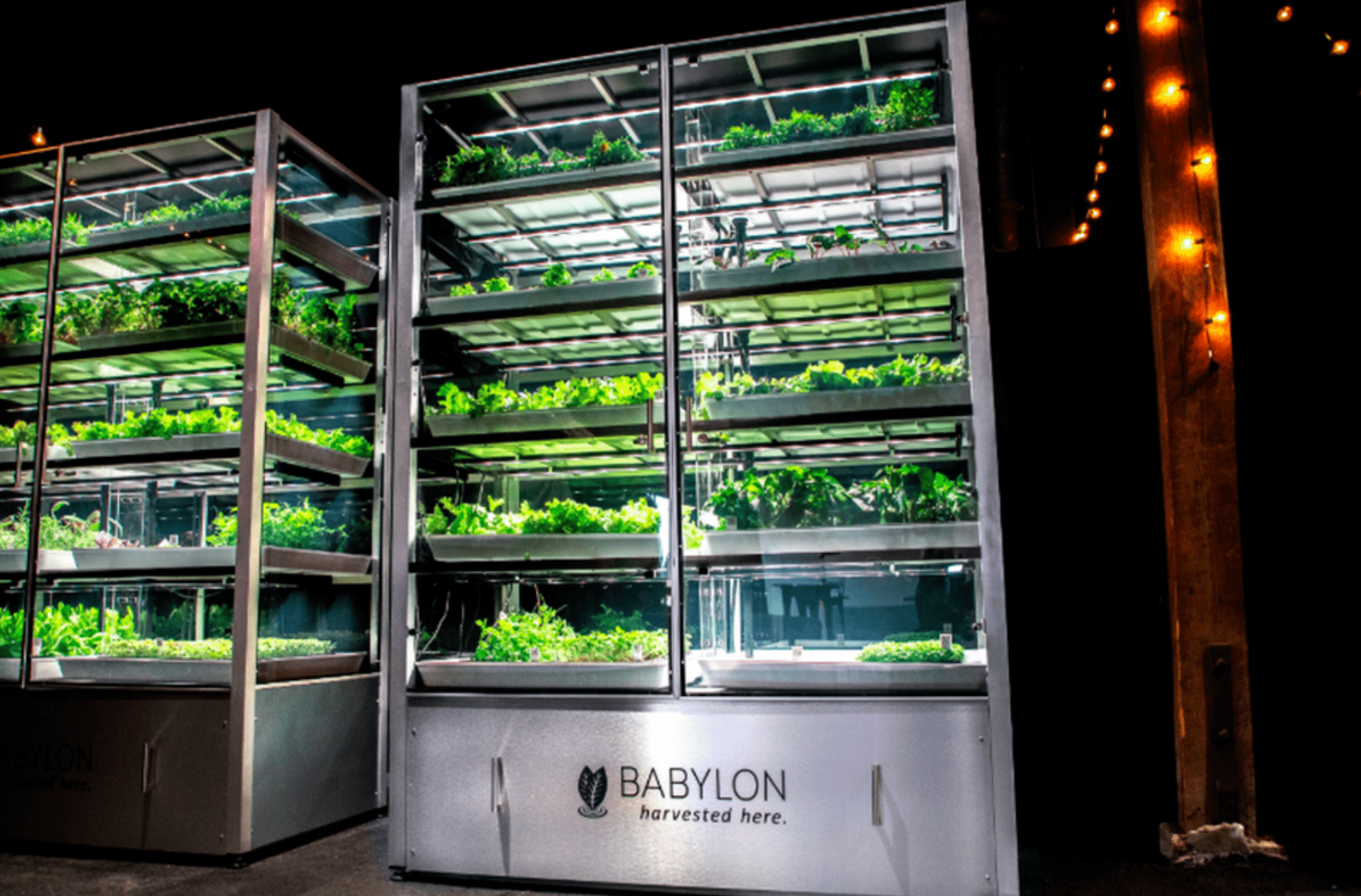Jul 6, 2023
Babylon Micro-Farms Builds Community and Embraces Hyperlocal Food Production

Credit: Babylon Micro-Farms.
Written by: Sarah Jordan and Dorothy Braun
July 6, 2023
Founded by University of Virginia students Graham Smith and Alexander Olesen, Babylon Micro-Farms was established in 2017 in an effort to provide food security for refugees. At the time, Richmond, where Babylon Micro-Farms is currently located, reported a 15.8% rate of food insecurity, which has likely increased due to the lasting effects of the pandemic.

Credit: VP Kamala Harris.
Developing technologies to simplify the growing process was at the forefront of Smith and Olesen’s work, and they thus created a proprietary product dubbed the “easiest to use hydroponic microfarm,” allowing for year-round crop production and an accompanying app to aid in monitoring and controlling the environmental conditions inside the growing cases. Nearly six years later, they have successfully helped to feed and reduce food miles to their own local community as well as in 30 other states that use the micro-farms for corporate dining, student dining, senior living communities, and event and hospitality venues.
“Bigger doesn’t mean better,” said Olesen, when asked about the value proposition of modular units like those made by Babylon. The units are designed to grow 45 different crops, many of which are culinary herbs, leafy greens, and edible flowers. Babylon’s units can deliver short-term benefits with less of the risk associated with larger farms. Part of creating a resilient food system includes hyperlocal production, and fresh produce can’t get much closer than having a unit from Babylon.
Plus, with Babylon Micro-Farms’s remote operators, even those with no growing experience can begin their journey in food production. Their horticulturalists operate a network of farms spanning three continents, helping owners of all experience levels grow fresh food. Their units can also be used as a supplement to traditional agricultural growers who want to embrace year-round crop production. Babylon Micro-Farms lowers the barrier of entry into vertical farming and the CEA industry by helping clients remotely operate their facilities and troubleshoot with expert growers as needed.
Recently, Babylon Micro-Farms’s flagship product Gallieri was recognized by the International WELL Building Institute, a people-centered wellness organization that seeks to build a future that embraces health and wellbeing for all. Babylon’s focus on delivering the freshest possible produce also allows users to embrace nature in indoor spaces as well as making healthy eating easy.
Babylon Micro-Farms was also recognized by the US government for their commitment to healthy lifestyles. To commemorate Small Business Week, April 30th through May 6th, 2023, Vice President Kamala Harris visited Babylon Micro-Farms. Selected for their exemplary approach to sustainable food production with American-made products and funded in part by federal research grants, Babylon received this honorable public recognition for being a leader in both the CEA sector and in small business initiatives.
In her remarks regarding investing in small business manufacturing, Vice President Harris congratulated many small business owners for their innovation and shaping America’s economy and future. While they are the backbone of the nation, the number one issue faced across the board by small businesses is their access to capital. The support Babylon Micro-Farms received along the way from investors and funders who believed in their mission cannot be overlooked amidst celebrating their success. Investing in entrepreneurial endeavors is critical, and this kind of bipartisan government support is especially important in the CEA industry due to its current financial challenges.

Credit: Babylon Micro-Farms.
Earlier this year, Babylon Micro-Farms closed their series A funding round after raising $8 million from investors and a grant from the National Science Foundation. With these investments, they hope to expand their operations and bring vertically farmed produce to even more people.
Investing in small businesses does more than bolster a company’s finances and chances of success – it also invests in communities and their ability to be vibrant, diverse, and collaborative spaces. Locally oriented investments can have huge collective impacts, as illustrated by Babylon Micro-Farms’s ability to serve their community and beyond through grants and other government initiatives.
With Babylon Micro-Farms’s recent addition to the Agritecture Designer Partner Network, users of the platform can easily obtain quotes and correspond with members of Babylon’s team to see how their solutions can integrate into your own CEA facility or plans. We are proud to have partners that are committed to building a more resilient, sustainable future for food production.
Babylon’s solutions can work in harmony with other aspects of urban agriculture, working as another source of revenue in the winter months. If you want to integrate their products into your existing facility or explore how Babylon’s units can help you begin your journey into CEA, feel free to contact them through our platform for more information.
Looking to begin your own CEA Entrepreneurial Journey? Agritecture Designer can support you along the way, or sign up for our upcoming webinar, Understanding the Entrepreneurial Journey of CEA.
